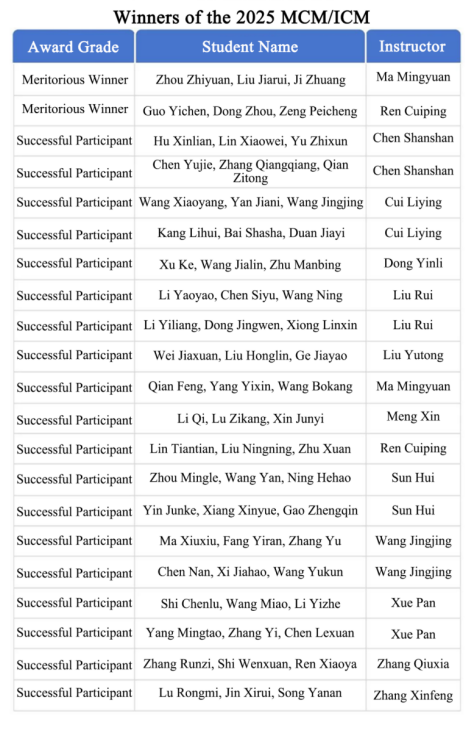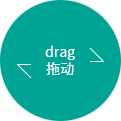On May 3, the results of the Mathematical Contest in Modeling and the Interdisciplinary Contest in Modeling in 2025 (2025 MCM/ICM) were officially announced. The participating teams of Xi'an Eurasia University won two Meritorious Winner awards and 19 Successful Participant awards, achieving a historic breakthrough in the quality of the awards won.

List of Award-Winning Students
As the world's largest and most influential interdisciplinary modeling competition platform, the MCM/ICM is sponsored by the Consortium for Mathematics and its Applications (COMAP) of the United States. Its problem choices deeply integrate cutting-edge topics in 12 fields, such as economy, management, environment, ecology, and medicine. It requires participating teams to complete a full-chain innovation cycle within a 96-hour time limit, covering problem abstraction, model construction, algorithm solving, and academic writing. This competition attracted 27,456 teams from higher education institutions around the globe, including Harvard University, Massachusetts Institute of Technology, and Tsinghua University.
Two teams from Xi'an Eurasia University won the Meritorious Winner awards, namely the team of Guo Yichen, Dong Zhou, and Zeng Peicheng and the team of Zhou Zhiyuan, Liu Jiarui, and Ji Zhuang, with teachers Ren Cuiping and Ma Mingyuan from the Mathematics and Information Technology Application Course Center of the School of General Education serving as instructors, respectively.
The Team Winning the Meritorious Winner Award, Including Guo Yichen, Dong Zhou, and Zeng Peicheng
The entry of the team of Guo Yichen, Dong Zhou, and Zeng Peicheng was "China's Solution to the Ecology-Economy Dilemma in Tourism Cities." They proposed a sustainable tourism management framework that integrates multi-objective optimization and hybrid recommendation systems to address the overtourism problem in Juneau. By establishing a four-dimensional objective function encompassing economic benefits, environmental impact, cultural preservation, and resident satisfaction, the team utilized the NSGA-II algorithm to find the Pareto optimal solution, balanced conflicting interests, and subsequently applied it to a simulation in Queenstown. This model provides a replicable technical pathway for cities worldwide facing the challenge of overtourism, contributing to the sustainable development goal of achieving "both gold and silver mountains as well as green mountains and clear waters."
The Team Winning the Meritorious Winner Award, Including Zhou Zhiyuan, Liu Jiarui, and Ji Zhuang
The entry of the team of Zhou Zhiyuan, Liu Jiarui, and Ji Zhuang, titled "Cutting-Edge Technology Behind Olympic Gold Medal Prediction," proposes an innovative solution to the problem of Olympic gold medal prediction. First, they used historical data to perform K-means clustering on participating countries, dividing them into three groups: Olympic powerhouses, medium-strength nations, and weaker countries. They then established a Random Forest model and analyzed feature importance to identify key cross-sectional factors such as GDP, sports funding, and the medal conversion rate. In order to capture the dynamic trend, the team introduced an Informer model to process time series rules and grasp the temporal characteristics of medal data more accurately. Second, the team used a "graph" structure to carry out the maximum flow algorithm to quantify the optimal talent delivery path and reveal implicit correlations. By assigning weighted values to historical events involving coaches, they derived optimal paths. Finally, the team used the correlation coefficient matrix to verify the statistical correlation between variables, such as economic indicators and athlete retirement cycles, and the number of gold medals.
Regarding the students' success to be among the elite 6.4% globally achieving this honor, Ren Cuiping commented, "From literature research to model testing, they've learned to use a mathematical framework to deconstruct real-world problems, which is a more important academic enlightenment than the awards themselves." Ma Mingyuan added, "The students have made a leap in the competition practice from simply 'applying formulas' to 'creating models.' They truly understand that mathematics is not just a calculator but a language for thinking about the world."
In recent years, the mathematical modeling project team of the School of General Education has continuously explored and established a three-in-one training system integrating course empowerment, practical training, and mentor guidance, forming a virtuous circle in which curriculum reform and competition practice promote each other. Ma Mingyuan believes that the outstanding achievements of students this year can be attributed to the organic integration and innovative breakthroughs in three core areas: First, the Mathematics and Information Technology Application Course Center launched training courses and learning support services, such as mathematics modeling, to strengthen students' theoretical and practical foundations; second, students enhanced their practical skills through activities like 48-hour simulation competitions, while teachers converted typical problems into teaching cases; finally, the instructor team provided comprehensive training before competitions, ranging from model construction to paper refinement, and after the competitions, transformed award-winning projects into teaching resources and updated course material packages. "We believe that those repeatedly deduced formulas and iterated codes will eventually transform into the light in students' eyes, helping them understand that mathematical modeling is not just a competition, but a force to change the world." said Ma Mingyuan.
In the future, the School of General Education will further promote the interdisciplinary integration of mathematical modeling education with artificial intelligence, big data and other fields, build a "academic + application" training system, and help students shine with innovative brilliance on a broader international stage.
(Text by Wang Jingjing, School of General Education; photos by Wu Lingli, Brand Communication Department)





